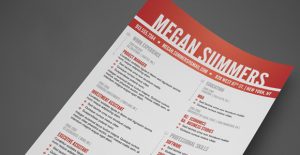When it was time for me to start looking into internships, I made an appointment with my college’s Career Services department.
The point of this meeting was to update my resumé and find a way to present my college experiences in a way that was intriguing to possible employers.
Like many college students, the ratio of my paid work to my studies was a little imbalanced. I spent way more time focusing on my GPA than I did on finding gainful employment. I mean, I worked at my school library (and still do), but that definitely was lower on my priority list.
Which brings me to the main idea of this post: No matter where you are in your life, there is a way to create an impressive resumé.
Back to High-School
When I was in high school—and was focused on producing a resumé that would get me into college—I thought that paying jobs and community service were the most important parts. Don’t get me wrong; they are impressive and important features of a resume.
But if you, like me, were more interested in enjoying your weekends in high school, there is still a way for you to build a good resumé.
For example, I’ve participated in a lot of presentations in college. To my great surprise, the advisor at Career Services told me those presentations should be included on my resumé. They show my academic interests, my public speaking skills and demonstrate that I know how to effectively research.
Presentations might not be the most obvious of achievements, but they are still worthy additions to a resumé.
For those of you in high school, important presentations (like a Senior Project or club proposal) will also impress those who work in college admissions.
Personal Skills
Other less-obvious additions could be your specific skills. I personally know how hard it is to describe what makes you “special” but trust me. Everyone has something to add. Even in my high school resumé, I had organizational and writing skills listed on my resume.
Admissions counselors—and the workforce—look for people who are able to coherently communicate and are able to manage their time and organize themselves.
So, if writing a paper is no big deal to you, or if you are able to balance a bunch of clubs and your studies, those are skills that should be included in your resumé.
It doesn’t matter whether you are in high school looking towards college or in college looking for a job; your strengths need to be listed.
Objective
Finally, one thing I learned at Career Services, that I had never even considered for a high school resumé was to include an objective.
This is basically a sentence or two that describes what you are aiming to gain from your resume.
For my current resume, my objective describes what sort of internships I am looking for. An objective for a high school student who wants to go to college should read something like this:
Acceptance at [insert type of college here] in order to begin study in the [insert major here] program beginning [insert semester and year here].
Objectives might seem like filler, but they are a necessary component in a resumé. It shows that you are interested in a specific college environment (or workplace) and hones in on exactly what you want from college. People surveying your application will most likely be impressed that you have a set plan in your mind and are determined enough to describe what you want.
Clarity about your goals can set you apart at any point in your life.
High School and College Resumé
All in all, updating a high school resumé or a college resumé is challenging, and can even be a pain. However, there are certain parts of life that are overlooked, when they really should be included in applications. In that way, writing a resume in high school and writing one in college are very similar endeavors.
If you take nothing else from this article, please remember this:
Don’t focus on what you don’t have for the resumé; focus on you what you do have that sets you apart. You’ll be surprised by how much you have to offer.

